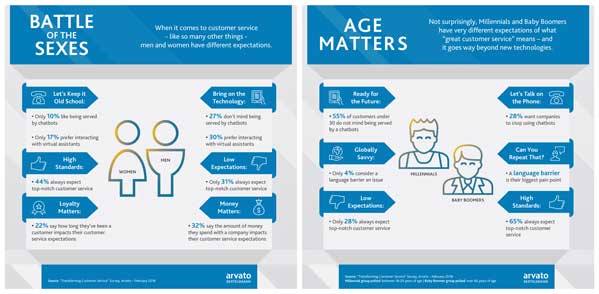Customer service provider Arvato has announced survey findings from a group of 500 consumers and business leaders in the customer service space, revealing that businesses think the customer service experiences they’re delivering are significantly better than consumers think they are.
89 percent of business respondents give their customer service a grade of A or B, and 84 percent believe their industries “usually” or “always” provide excellent customer service. However, only 52 percent of consumers agree – and only 9 percent think that they “always” get excellent customer service.
This is surprising, since one of the only things businesses and consumers do agree upon is that customer experience is central to brand loyalty. On a scale of 1-10, businesses rank the importance of customer service as a loyalty and retention tool at 8.4; similarly, consumers rank customer service’s impact on brand loyalty at 7.8.
 “Given how critical strong customer service is to the overall success of a brand, it’s surprising that so many businesses are not more aligned with their customers’ needs and wants,” said Fara Haron, CEO of Arvato CRM Solutions, North America and Philippines.
“Given how critical strong customer service is to the overall success of a brand, it’s surprising that so many businesses are not more aligned with their customers’ needs and wants,” said Fara Haron, CEO of Arvato CRM Solutions, North America and Philippines.
Consumer Pain Points – and Business Failings
According to consumers, customer service departments are getting the job done – only 9 percent reported that their biggest pain point was that their issue wasn’t getting solved. However, most respondents agree that the execution is poor and convenience is lacking: issues like long hold times (34 percent) and having to repeat information (31 percent) are bigger complaints for consumers.
Unfortunately, businesses don’t seem to be prioritizing these pain points; only 14 percent reported that they are focused on shortening long hold times this year. Similarly, the majority of consumers expect 24/7 customer service availability; however, only 40 percent of businesses acknowledge this expectation.

Uncertainty around Technology
The survey also revealed that businesses don’t have a clear vision for technology adoption: the majority of respondents don’t have plans to adopt technologies like chat bots (65 percent), virtual assistants (58 percent) or video chat (55 percent). As a consequence of this, consumers want to stick to the basics. Only 6 percent of consumers who have interacted with a chatbot in a customer service setting want more companies to offer them – and 49 percent don’t want to be served by a chatbot at all. Another measure: 52 percent say the phone is the most reliable channel for solving a customer service issue.
“What these insights highlight is a need to focus on the process of delivering customer service; not just the outcome – and for that, people matter just as much as technology,” said Haron. “Businesses need to focus on how they’re delivering customer service to make the process convenient, personalized and seamless for their customers.”
Survey Methodology
Arvato used a third-party provider to determine the findings of its Transforming Customer Service Survey. They collected responses over a two-week period from 250 consumers and 250 business leaders in the customer service field. All respondents were based in the United States.




